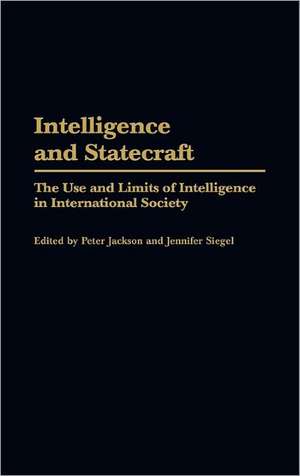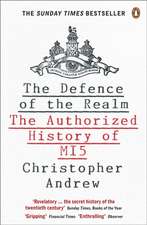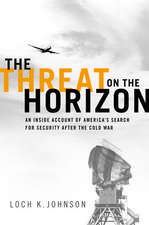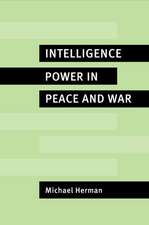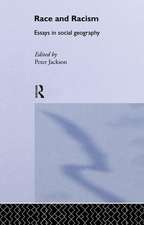Intelligence and Statecraft: The Use and Limits of Intelligence in International Society
Autor Peter Jackson, Jennifer Siegelen Limba Engleză Hardback – 29 apr 2005 – vârsta până la 17 ani
Preț: 564.42 lei
Preț vechi: 771.27 lei
-27% Nou
Puncte Express: 847
Preț estimativ în valută:
108.01€ • 115.49$ • 90.05£
108.01€ • 115.49$ • 90.05£
Carte tipărită la comandă
Livrare economică 18 aprilie-02 mai
Preluare comenzi: 021 569.72.76
Specificații
ISBN-13: 9780275972950
ISBN-10: 027597295X
Pagini: 302
Dimensiuni: 156 x 235 x 28 mm
Greutate: 0.58 kg
Ediția:New.
Editura: Bloomsbury Publishing
Colecția Praeger
Locul publicării:New York, United States
ISBN-10: 027597295X
Pagini: 302
Dimensiuni: 156 x 235 x 28 mm
Greutate: 0.58 kg
Ediția:New.
Editura: Bloomsbury Publishing
Colecția Praeger
Locul publicării:New York, United States
Notă biografică
Peter Jackson is Senior Lecturer in International Politics in the Department of International Politics at the University of Wales, Aberystwyth. He has published widely in the fields of intelligence and security studies, French strategy and diplomacy and the origins of the Second World War. His most recent publication is Understanding Intelligence in the Twenty-First Century.Jennifer Siegel is Assistant Professor of History at Ohio State University. She specializes in modern European diplomatic and military history, with a focus on the British and Russian Empires. She is author of Endgame: Britain, Russia and the Final Struggle for Central Asia, winner of the 2003 AAASS Barbara Jelavich Prize.
Cuprins
List of Abbreviations and AcronymsIntroduction by Peter Jackson and Jennifer SiegelHistorical Reflections on the Uses and Limits of Intelligence by Peter JacksonPoor Intelligence, Flawed Results: Metternich, Radetzky and the Crisis-Management of Austria's "Occupation" of Ferrara in 1847 by Alan SkedSanctioned Spying: The Development of the Military Attache in the 19th Century by Maureen O'ConnorRussia's Great Game in Tibet: Tsarist Intelligence and the Younghusband's Expedition by David Schimmelpennick van der OyeTraining Thieves: The Instruction of "Efficient Intelligence Officers" in pre-1914 Britain by Jennifer SiegelThe Royal Navy, War Planning and Intelligence Assessments of Japan between the Two World Wars by Christopher BellSoviet Intelligence on Barbarossa: The Limits of Intelligence History by David StoneOperation Matchbox and the Technological Containment of the USSR by Paul MaddrellThe Stasi and the Evolution of the FGR's "Ostpolitik," 1969-1974 by Mary Elise Sarotte
Recenzii
[T]races the rise and development of the military attache from the nineteenth century and links this to the increasing demand for intelligence generated by the requirements of modern war..[f]ascinating new tidbits of information. This remains a fertile field for cultivation.
